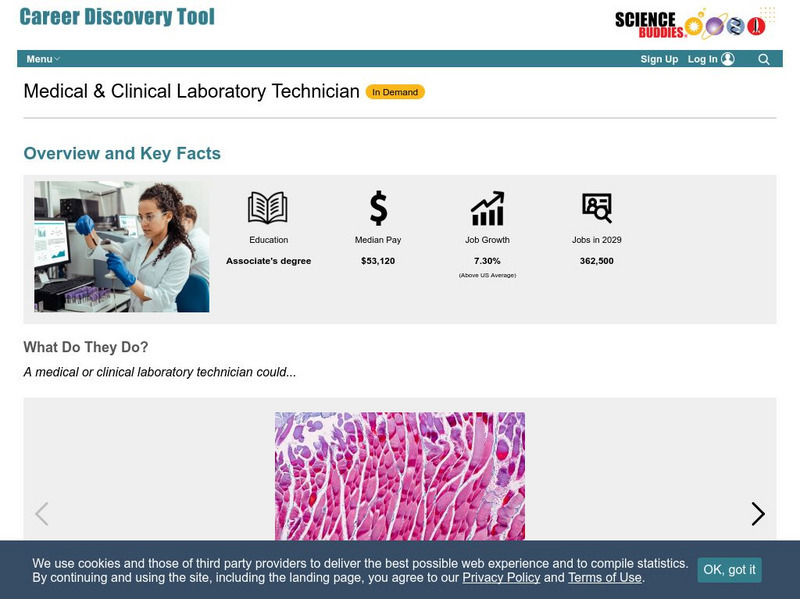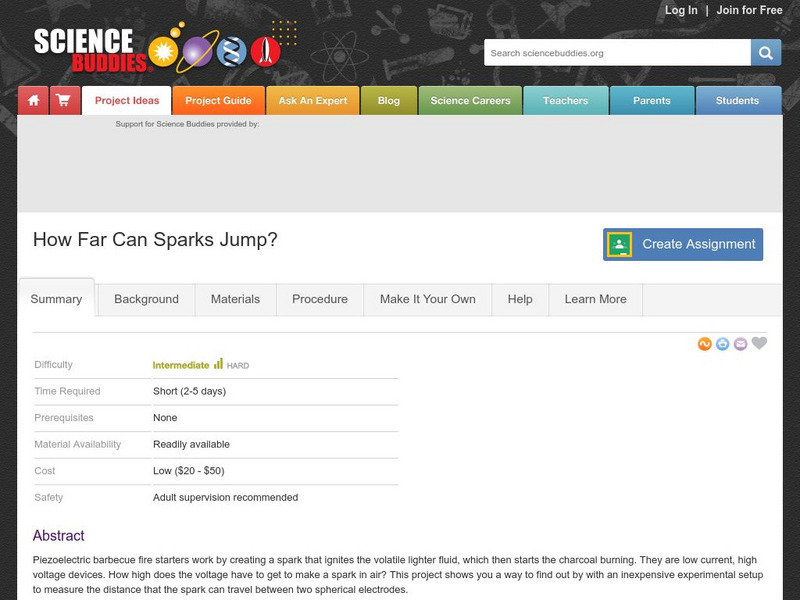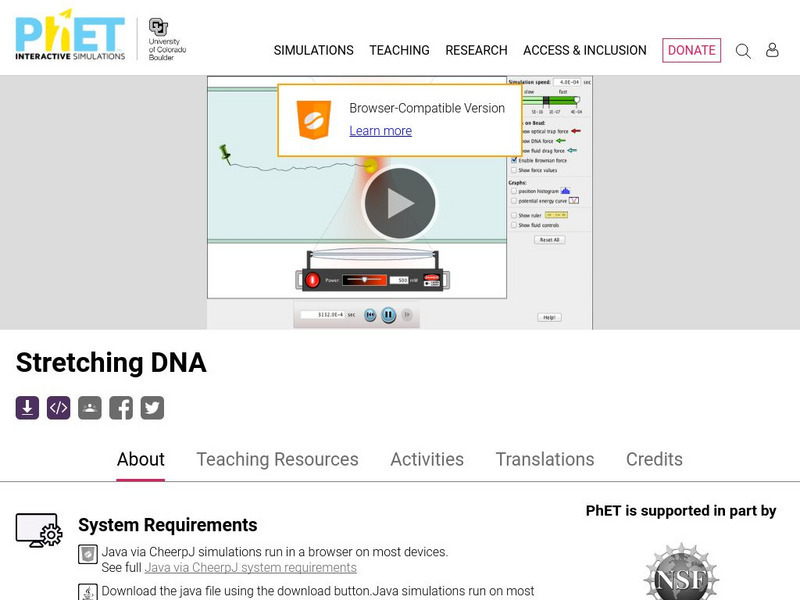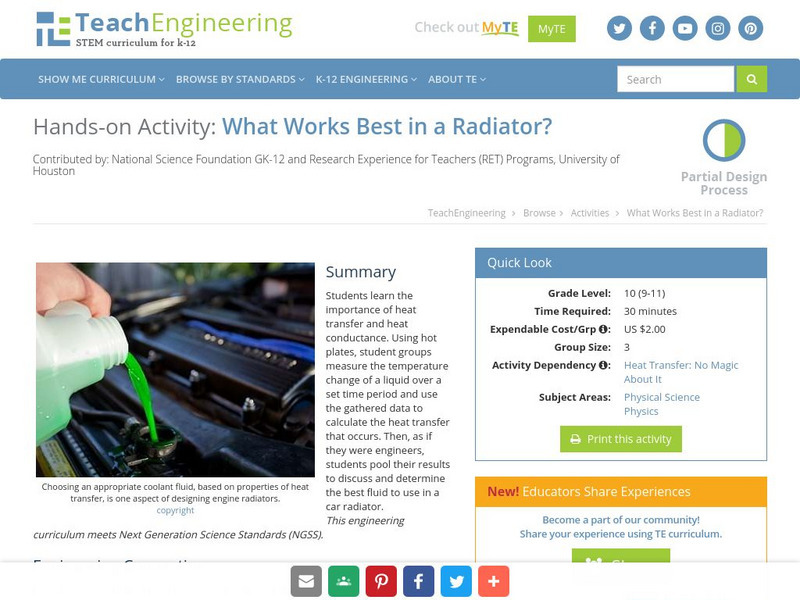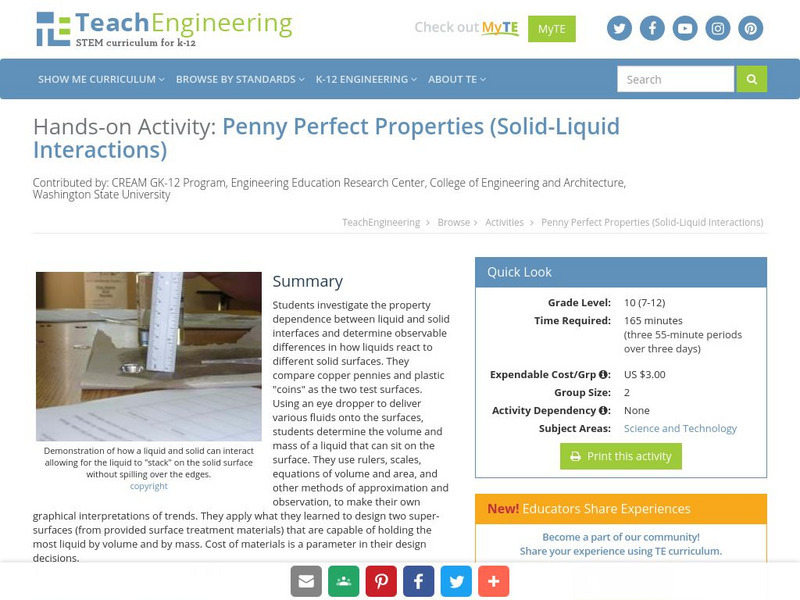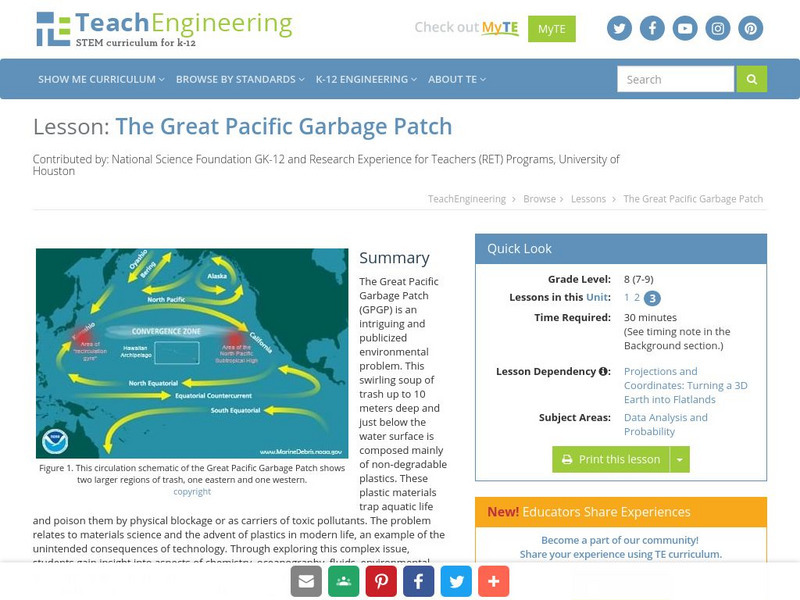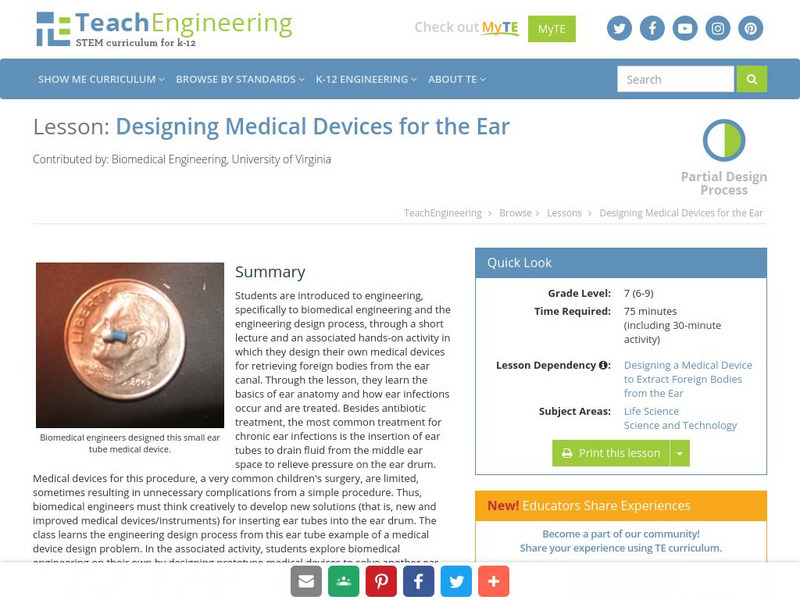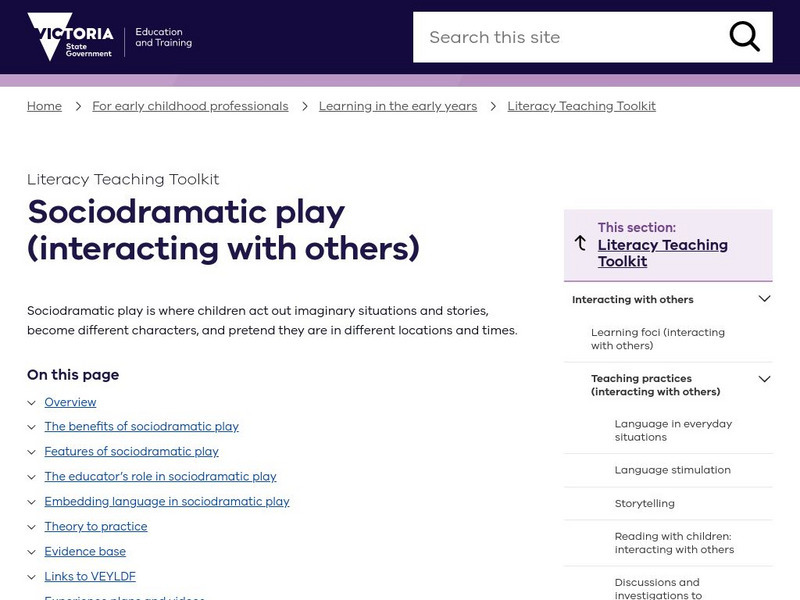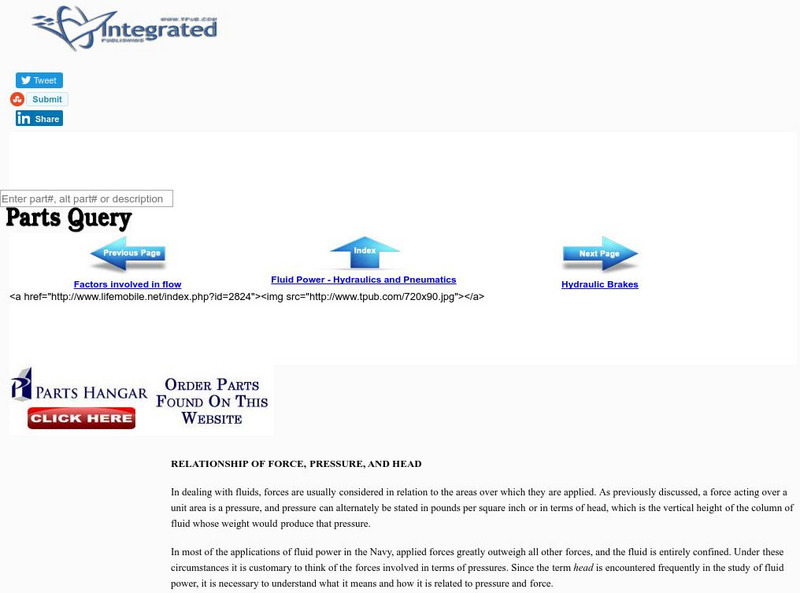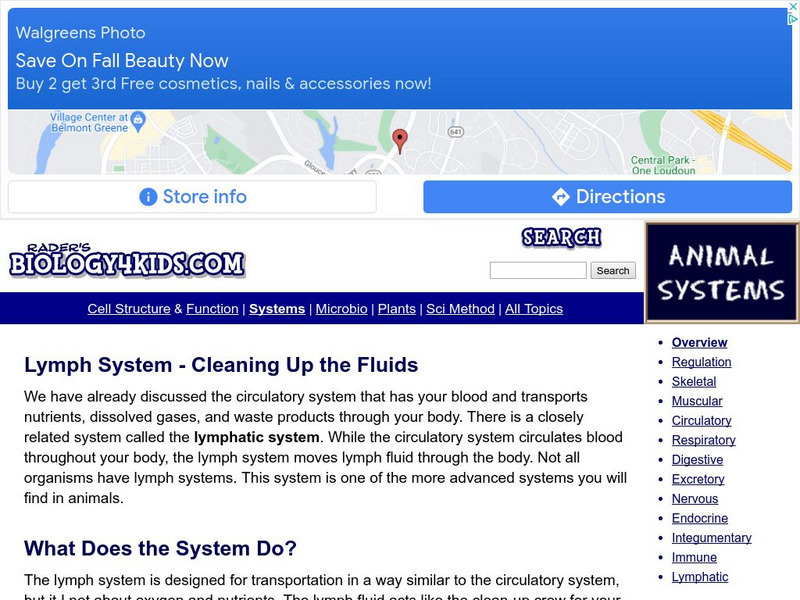TeachEngineering
Teach Engineering: Particle Sensing: The Coulter Counter
Students are presented with a short lesson on the Coulter principle, an electronic method to detect microscopic particles and determine their concentration in fluid. Depending on the focus of study, students can investigate the...
University of Arizona
The Biology Project: Immunology: Hiv Simulation: Simulating the Spread of Hiv
This web-based simulation demonstrates potential spread of HIV through a population. Each participant exchanges virtual body fluids with other participants, some of whom are HIV positive. A computer-simulated ELISA will illustrate the...
Science Buddies
Science Buddies: Career Profile: Medical & Clinical Laboratory Technician
Find out about the work done by the medical laboratory technician. It involves examining both body fluids and cells under the microscope or with specialized computer equipment, analyzing the results, and forwarding that information on to...
Science Buddies
Science Buddies: How Far Can Sparks Jump?
Piezoelectric barbecue fire starters work by creating a spark that ignites the volatile lighter fluid, which then starts the charcoal burning. They are low current, high voltage devices. This project shows you a way to find out by with...
Science Buddies
Science Buddies: Singing Wine Glasses
Making a glass sing is not always as easy as it looks. This project explains the science behind the interesting hobby. You will be asked how the amount of fluid within a glass affects its pitch.
University of Colorado
University of Colorado: Ph Et Interactive Simulations: Stretching Dna
Explore stretching just a single strand of DNA using optical tweezers or fluid flow. Experiment with the forces involved and measure the relationship between the stretched DNA length and the force required to keep it stretched. Is DNA...
PBS
Pbs Kids: Zoom Printables & Activities
Fantastic variety of printable activities that cover motion-related principles. Topics include the following: experiments (engineering, structures, forces and energy, fluids, sound and light, patterns, human body); arts & crafts;...
University of Colorado
University of Colorado: Ph Et Interactive Simulations: Buoyancy
An interactive simulation that teaches about buoyancy and density by applying various forces and modifying the properties of objects and fluids. This simulation can either be downloaded or played online and includes handouts, lesson...
TeachEngineering
Teach Engineering: What Works Best in a Radiator?
Students learn the importance of heat transfer and heat conductance. Using hot plates, student groups measure the temperature change of a liquid over a set time period and use the gathered data to calculate the heat transfer that occurs....
TeachEngineering
Teach Engineering: Active and Passive Transport: Red Rover Send Particles Over
Students compare and contrast passive and active transport by playing a game to model this phenomenon. Movement through cell membranes is also modeled, as well as the structure and movement typical of the fluid mosaic model of the cell...
TeachEngineering
Teach Engineering: Penny Perfect Properties (Solid Liquid Interactions)
Students investigate the property dependence between liquid and solid interfaces and determine observable differences in how liquids react to different solid surfaces. They compare copper pennies and plastic "coins" as the two test...
TeachEngineering
Teach Engineering: Surgical Device Engineering
This unit focuses on teaching students about the many aspects of biomedical engineering (BME). Students will see that it is a broad field that relies on concepts from each of the other disciplines of engineering. They will also begin to...
TeachEngineering
Teach Engineering: Viscoelasticity
Students are introduced to the concept of viscoelasticity and some of the material behaviors of viscoelastic materials, including strain rate dependence, stress relaxation, creep, hysteresis and preconditioning. Viscoelastic material...
TeachEngineering
Teach Engineering: The Great Pacific Garbage Patch
The Great Pacific Garbage Patch (GPGP) is an interesting and somewhat publicized environmental problem. A swirling soup of trash up to 10 meters deep and just below the water surface is composed mainly of non-degradable plastics. These...
TeachEngineering
Teach Engineering: Surfactants: Helping Molecules Get Along
Students learn about the basics of molecules and how they interact with each other. They learn about the idea of polar and non-polar molecules and how they act with other fluids and surfaces. Students acquire a conceptual understanding...
TeachEngineering
Teach Engineering: Designing Medical Devices for the Ear
Students are introduced to biomedical engineering and the engineering design process through a short lecture and an activity in which they design their own medical devices for retrieving foreign bodies from the ear canal. They learn...
Grammarly
Grammarly Blog: All About Transition Words
Types of transition words and how they can be used to make writing more fluid.
Smithsonian Institution
Smithsonian Science Education Center: Science: A Work in Progress
The scientific method is more than just a series of steps to be followed like a recipe. It is a fluid, ever-changing process. This video discusses student's perception of the scientific method and how to make learning science in the...
TeachEngineering
Teach Engineering: Making Model Microfluidic Devices Using Jell O
Students create large-scale models of microfluidic devices using a process similar to that of the PDMS and plasma bonding that is used in the creation of lab-on-a-chip devices. They use disposable foam plates, plastic bendable straws and...
Technovation
Curiosity Machine: Challenges: Make a Hydraulic Machine
Can you lift pennies with water? In this challenge, students will build a machine that uses a fluid to move and can lift at least 10 pennies. On this site, there is also tips, a lesson plan, and a place for students to document their...
Other
Victoria State Government: Sociodramatic Play (Interacting With Others)
Sociodramatic play is where children act out imaginary situations and stories, become different characters, and pretend they are in different locations and times. Sociodramatic play is the most advanced form of play, and constantly...
Integrated Publishing
Integrated Publishing: Pressure and Head
Detailed site dealing with pressure and force. The site is very complete with numerous examples and illustrations.
Concord Consortium
The Concord Consortium: Molecular Workbench: Archimedes' Buoyancy Principle
Adjust the ratio of the masses of different particles to see how buoyancy is affected.
Biology 4 kids
Biology4 Kids: Lymph System Cleaning Up the Fluids
Find out what the lymphatic system does, how it works with other systems, and the significance of keeping an eye on the lymph nodes.
Other popular searches
- Body Fluids
- Forces in Fluids
- Viscosity of Fluids
- Bodily Fluids
- Forces and Fluids
- Fluids and Electrolytes
- Displacement of Fluids
- Electro Rheostat Fluids
- Electra Rheostat Fluids
- Exercise and Body Fluids
- Bill Nye Fluids
- Health Body Fluids


